My wife and I realize that we are what we eat, and that good food is far less expensive than illness or doctors. It this reason that we made the decision to raise as much of our own food as possible, and we have been raising our own chickens for Meat for the last four years.
Our home sits on a quarter acre of somewhat usable land. It is on a hill with lots of trees, so we can’t raise our own beef or pork, which we buy directly from the farmer.
However, we can raise chicken.

This monster dressed out at over eight pounds.
It does not require a lot of land or space, and depending upon your situation you may be able to raise your own meat birds even if you live in a populated area. We happen to live just inside city limits, but we have a wooded area without neighbors behind us, which is great for a little food anarchy.
The breed of chicken we raise is the very same that you would buy in the grocery store, except ours are raised organically and have ample room to enjoy their short happy lives.
If you eat store bought meat and are not familiar with the horrific conditions of factory farming, you should be aware of the practices used to provide what you are eating.
We first started with a small batch of just eight chicks, and the second batch was twelve. Once acquainted with the process and having invested in adequate housing for our meat birds, and some minimal equipment for processing, we now raise three batches of twenty five per year. This provides well over four hundred pounds of organic chicken a year for our personal consumption.
Jumbo Cornish X Rocks are a very tasty hybrid variety of chicken and have an excellent feed conversion ratio of about two pounds of feed per pound of dressed chicken, in only eight weeks. They are favored in the commercial markets because of their large breasts, and rapid growth. As a result of their rapid growth, they do not forage much, and will not require as much space to be happy as other breeds.
Factory farms allow almost zero space.
Our initial meat bird house was just a 4 by 8 foot add on to our existing hen house. It was ok for eight birds, but not for a batch of twenty five. So we built an 8 foot square chicken house which can be adapted internally to the chickens stage of growth. In addition there is an 8 foot by 16 foot outdoor area available for sun and play during the day. This size works well for 25 chickens, and gives plenty of room. We keep the outdoors area covered to protect the birds from the Hawks, who also love chickens.

The Drum Stick Inn when under construction.
During the first two or three weeks (or longer, depending on climate) they need to be kept under a 200 watt heat lamp to keep them warm. When old enough they will handle the cold better, but do not handle extreme heat well.
We live in an area that will often get below freezing in the winter, and well above 100 to 110+ degrees in the summer. Usually by June the temperatures here exceed 95, or even 100 degrees. These birds do not do well at these temperatures, and can die at temps over 95. So we do not raise any during the summer months.
If you go to your local feed store around March/April you will find these birds for sale for about $2.50 a piece. They will usually be a few days to a week old. Because we need to raise seventy five birds a year, and we do not have the space to raise, or freezer storage for seventy five birds, we need to do it in three batches. Purchasing local in March or April will only allow for one batch before the heat. So we order ours from a hatchery.
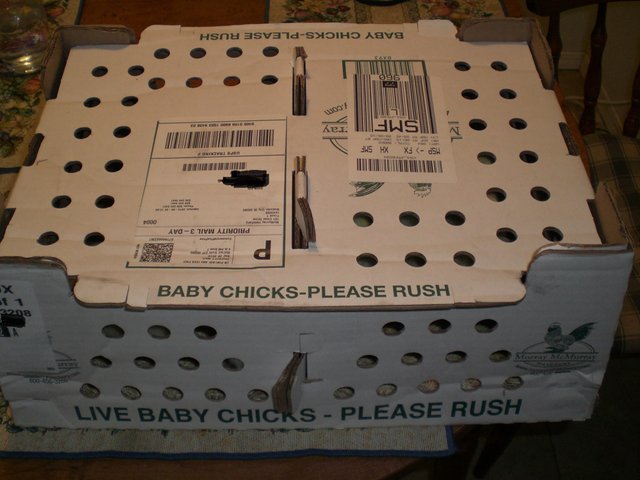
This batch just arrived today. Inside are 25 two day old chicks. They were shipped immediately after hatching on Monday, and arrived on Wednesday.
Yes, these day old chicks are shipped all the way from Iowa to far Northern California via US Mail. It takes about two days, and they always show up alive and healthy. Our last batch of the year is shipped at the end of September, just when it starts to get cooler and will be harvested Thanksgiving weekend.
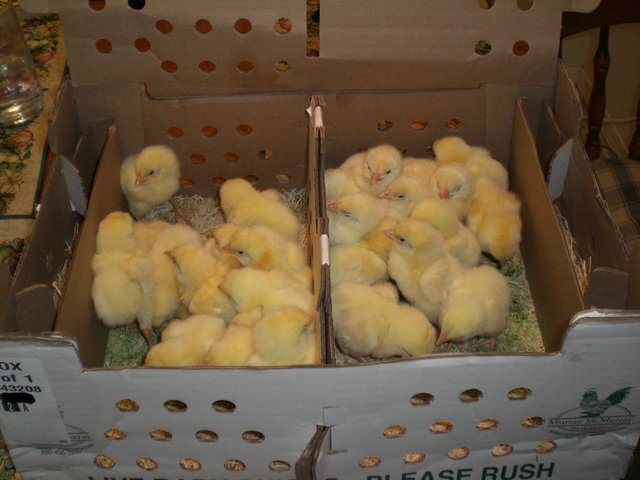
All are alive and well.
The first batch of the next year is shipped end of January, and harvested end of March. The second batch, is actually what I call the last batch of the chicken year. It is shipped end of March and harvested late May. We take a break for the summer, and start again in September, avoiding the heat issue.
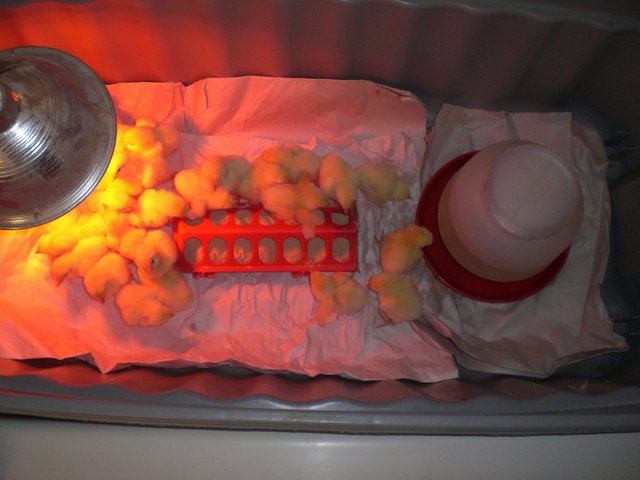
When the two day old chicks arrive, they are usually kept in a container with a heat lamp in a bathtub for a day or two. This way we can enjoy these little creatures (they are cute) and make sure all are healthy, while keeping the cat away.
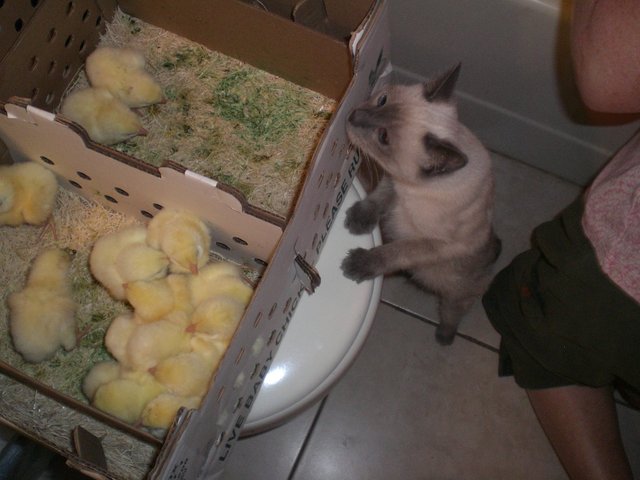
In a couple of days they will go to their new home.
The 8 x 8 foot chicken house has internal removable partitions to condense into a 4 x 4 foot area, which allows the birds to stay warm under the heat lamp (when young) and still have room to move about out of the heat. Later the partitions are expanded to a 8 x 4 foot area when they are old enough, and finally the partition is removed completely and the outside door is open for outdoor sun and play.
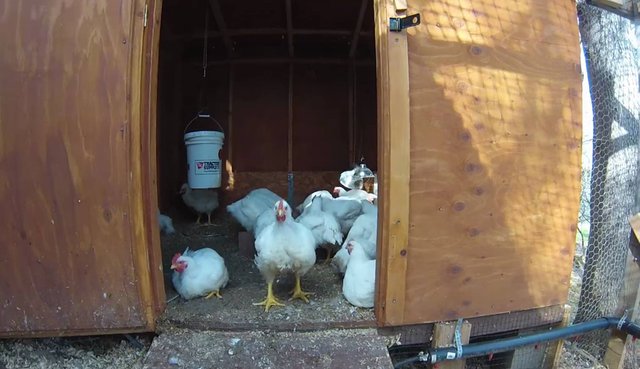
This is a previous batch, just prior to harvest.
Once the little chicks are in their new home, it is just a matter of keeping them fed, watered, healthy, and happy, until harvest time.
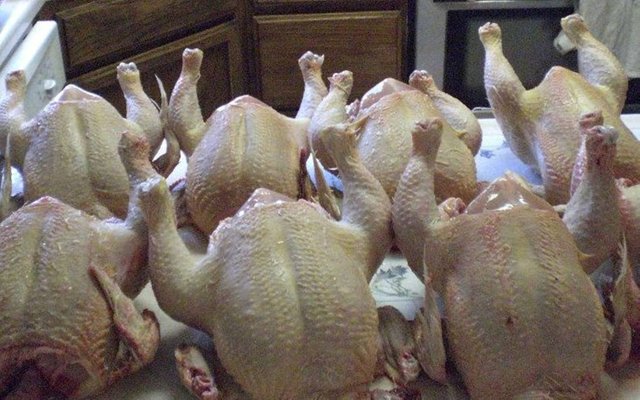
This was our very first batch of eight. I had not yet got the scalding technique correct, and accidentally overdid it. Hence the reddish color on some of the skin.
When harvested these birds will average about 6.5 pounds each dressed out. Dressed out means cleaned like you would buy a whole chicken at the grocery store.
Our September shipment of meat birds just arrived today. I will try remember to take some more pictures/ videos as they grow, and I expect to cover health issues, some natural treatments we have found that work, if anyone is interested, in part two.
And.. If anyone has an interest ??? I can cover what we have learned about the harvesting process, when that time comes about Thanksgiving time.
Some people like to eat meat. For my wife and I, we do the best we can to avoid factory farmed food, and are just doing what we believe to be the right thing to do, the best we can. We are not experts. We learn as we go, and only wish only to learn more, and share what we have learned. So comments are appreciated.
Thank you.
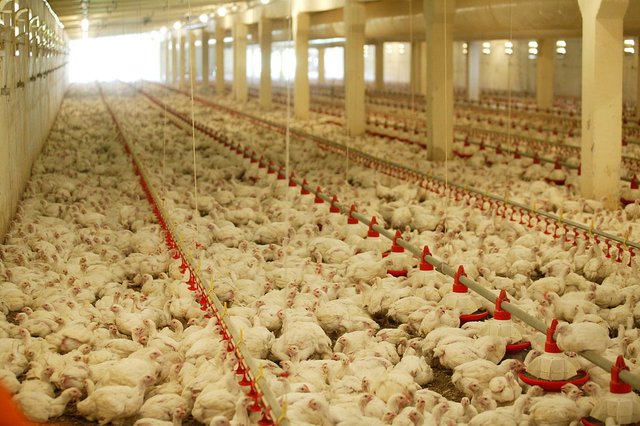
Congratulations! Homegrown is the best food. Good luck and keep us posted.
Downvoting a post can decrease pending rewards and make it less visible. Common reasons:
Submit
Thank you.
Downvoting a post can decrease pending rewards and make it less visible. Common reasons:
Submit
Excellent post! I also raise chickens, not just for food, also for showing, selling and yes, I do also utilize my roosters as food! There is nothing like a good home grown chicken.
You definitely have a new follower.
Downvoting a post can decrease pending rewards and make it less visible. Common reasons:
Submit
Yes, there is nothing like homegrown chicken. Like most home grown food, it tastes much better, and is better for you than store bought. Thanks for reading and the reply.
Downvoting a post can decrease pending rewards and make it less visible. Common reasons:
Submit
I make a pretty good income selling chicks and hatching eggs! Which brings down the cost of food greatly, and we are eating clean.
Downvoting a post can decrease pending rewards and make it less visible. Common reasons:
Submit
Good to hear you can make some money, because organic feed is not cheap. I can access organic layer feed locally, but the organic broiler pellets have to be brought in from 250 miles away. My wife sells a few eggs to defray cost, but our layers are about three years old now, and they are not producing quite as much. We will be facing a dilemma next year, because we eat a lot of eggs.
Downvoting a post can decrease pending rewards and make it less visible. Common reasons:
Submit